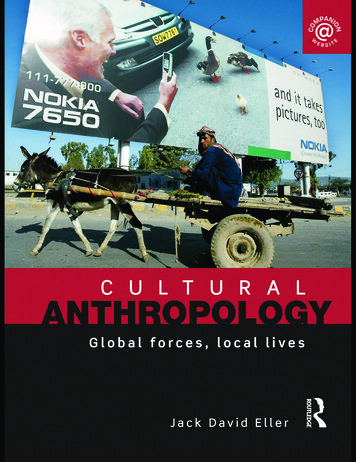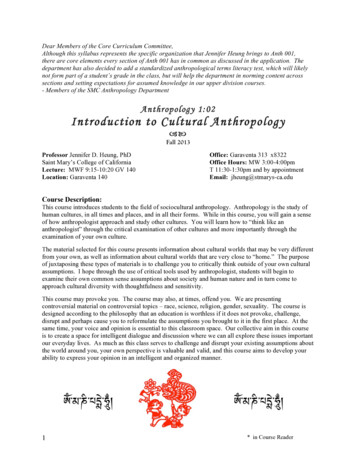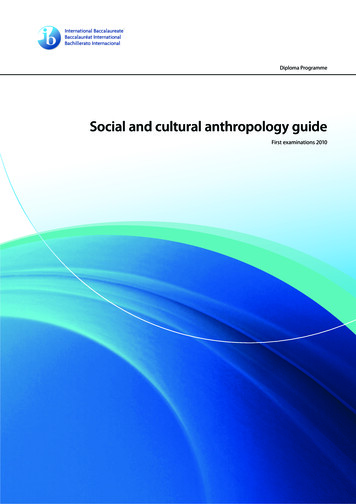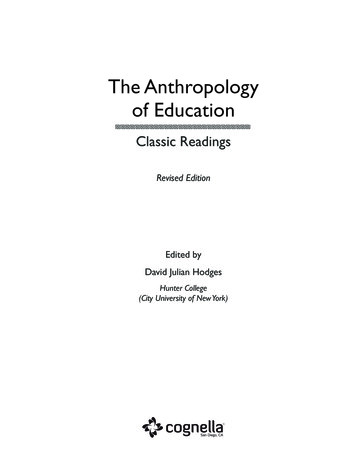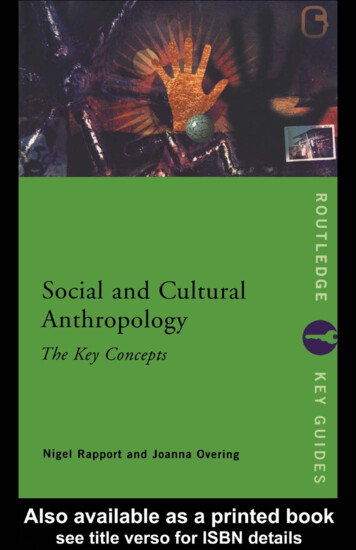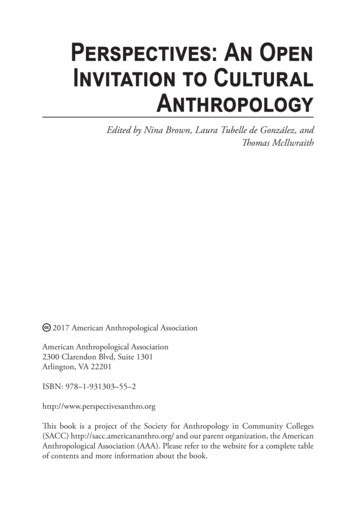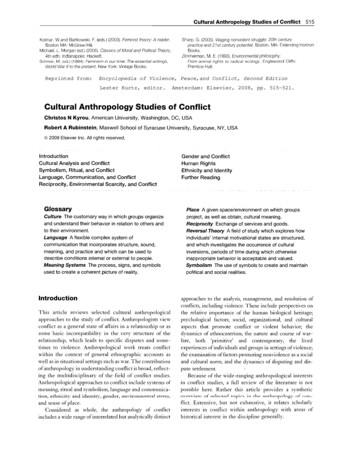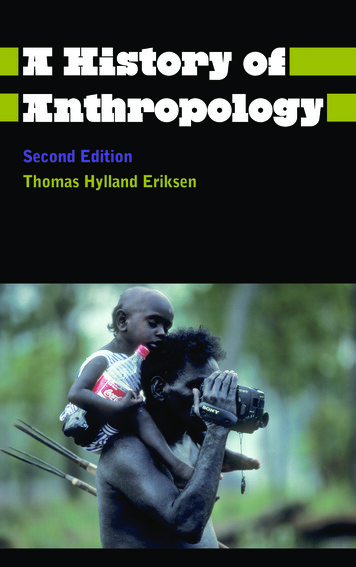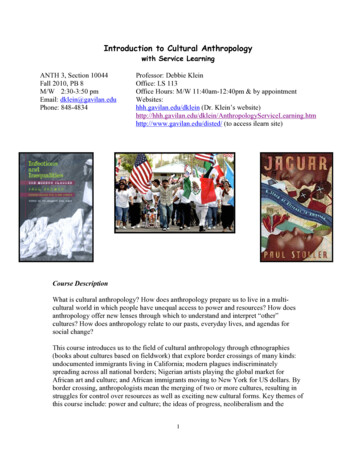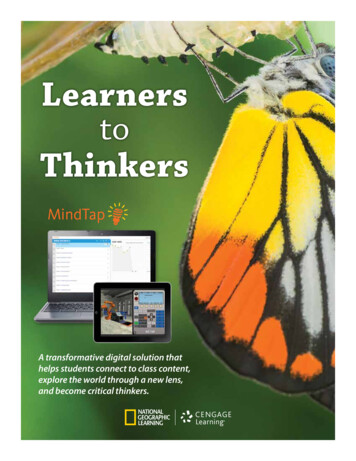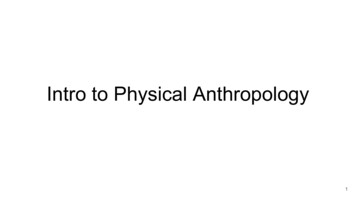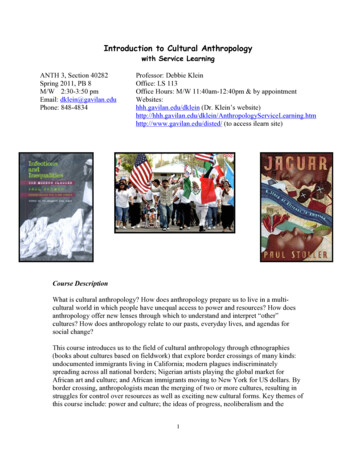
Transcription
Introduction to Cultural Anthropologywith Service LearningANTH 3, Section 40282Spring 2011, PB 8M/W 2:30-3:50 pmEmail: dklein@gavilan.eduPhone: 848-4834Professor: Debbie KleinOffice: LS 113Office Hours: M/W 11:40am-12:40pm & by appointmentWebsites:hhh.gavilan.edu/dklein (Dr. Klein’s ServiceLearning.htmhttp://www.gavilan.edu/disted/ (to access ilearn site)Course DescriptionWhat is cultural anthropology? How does anthropology prepare us to live in a multicultural world in which people have unequal access to power and resources? How doesanthropology offer new lenses through which to understand and interpret “other”cultures? How does anthropology relate to our pasts, everyday lives, and agendas forsocial change?This course introduces us to the field of cultural anthropology through ethnographies(books about cultures based on fieldwork) that explore border crossings of many kinds:undocumented immigrants living in California; modern plagues indiscriminatelyspreading across all national borders; Nigerian artists playing the global market forAfrican art and culture; and African immigrants moving to New York for US dollars. Byborder crossing, anthropologists mean the merging of two or more cultures, resulting instruggles for control over resources as well as exciting new cultural forms. Key themes ofthis course include: power and culture; the ideas of progress, neoliberalism and the1
nation-state; immigration and identity; race and gender; inequality and structuralviolence; transnational collaborations; globalization; and transformation.By getting a chance to participate in a community-based service learning projectthroughout the semester, you will become familiar with a community organization ofyour choosing. Over the course of the semester, you will spend 20-30 hours workingwithin your community organization. As you go, you will critically reflect upon yourcommunity service experience through class discussions and writings. You will write twoethnographic papers based on your service learning experience. Throughout your servicelearning project, you will practice and apply your anthropological skills—researchmethods; descriptive and reflexive writing; and cultural interpretation and analysis.Course Learning Outcomes Describe and analyze issues of power and inequality in a range of non-westernand western cultures in Africa, the Caribbean, and the United States.Demonstrate intercultural communication skills.Comprehend own social and cultural group identities and the relative privilege ormarginalization of each.Identify and demonstrate the importance and limitations of a culturally relativisticoutlook in today’s world.Examine the relevance of comparative cultural studies in the search for a betterunderstanding of the United States and other countriesDemonstrate the utility of a holistic approach to cultures.Analyze and explain cultural practices as they are embedded within systems ofrace, class, and gender.Demonstrate knowledge of the demographics, socio-cultural dynamics and assetsof a specific local community.Examine and analyze a community issue in the context of structural inequalities.Enter, participate in, and exit a community with respect and integrity.Demonstrate reciprocity and responsiveness in service work with community.Each of the above outcomes will be measured by: response papers, quizzes,exams, discussion participation, and a semester-long Service Learning project.Course RequirementsClass Participation & Reflection EntriesQuizzes & Response PapersMidtermFinal ExamFinal Research Paper & Presentation20%20%25%15%20%Class Participation & Reflection Entries (20%)Attendance at all class meetings is required. If you miss 4 classes, you will be droppedfrom the course. The college policy on attendance is that students missing one more classhour than the unit value for that particular course may be dropped without possibility ofcredit. Do not be late: lateness is disrespectful to the instructor and your classmates.2
You are expected to read the assignments before each class and come prepared toparticipate in class discussions and exercises. Be prepared to read between 40 to 100pages a week. Please read critically and take notes, making sure you understand theauthors’ main points. Also, I encourage you to keep a personal reading journal in whichyou write down your reflections and questions for class discussion.You will write and post to ilearn a 200 word (minimum) reflection entry after eachService Learning shift due before 9pm on Sundays. You will write a total of 8 reflectionentries for credit.Quizzes & Response Papers (20% total)Several quizzes based on course readings and lectures will be given throughout thesemester. Response papers based on specific readings or films will be assigned inadvance.A response paper is 1-2 pages, typed and double-spaced. While it is a relatively openformat, your response paper should deal with one or a few of the main points made by theauthor or film. I am interested in your critical thinking here: tell me what you think aboutthe piece. While some summary is fine, I do not want a summary paper. For example,you might consider these questions before you write: Given what the author or film wastrying to convey, do you agree or disagree? Why or why not? Do you have lingeringquestions about the material presented? Did you appreciate the piece? Why or why not?Midterm (25%)The Midterm consists of a take-home essay and a fieldwork paper. Based on assignedreadings, topics covered in class and videos, the essay will require synthetic and criticalthinking. The fieldwork paper will give you the opportunity to begin the process offormally writing up your fieldwork experience, using ethnographic writing techniques ofthick description and analysis.Final Exam (15%)The final will be a take-home essay exam. Based on assigned readings, topics covered inclass and videos, questions will require synthetic and critical thinking.Final Research Paper and Presentation (20%)Your 6-8 page final paper (typed and double-spaced) is due on the last day of class. Itwill be based on the original ethnographic research that you conducted throughout thecourse. In this paper, you will integrate description and an anthropological analysis ofyour topic. Please choose from the topics listed at the end of the syllabus. In the lastweeks of class, you present your research findings in a creative presentation.Final GradesYOU MUST COMPLETE ALL OF THE ABOVE REQUIREMENTS IN ORDER TOPASS THE COURSE. Your grade in the course will be based on: class participation &reflection entries (20%); quizzes & response papers (20%); midterm (25%); final (15%);and final research paper and presentation (20%).90%-100% A; 80%-90% B; 70%-80% C; 60%-70% D; below 60% F3
Important NotesStudents requiring special services or arrangements because of hearing, visual, or otherdisabilities should contact their instructor, counselor, or the Disability Resource Center(DRC) at 848-4865.You are expected to exercise academic honesty and integrity. Violations such as cheatingand plagiarism will result in disciplinary action that may include recommendation fordismissal.Classroom EtiquetteI aim to create and facilitate a productive, comfortable and exciting learning environmentfor each student. In order to do this, I need your cooperation and willingness to take thislearning environment seriously. Here are some of my requirements: Walk into the classroom each day with an open mind. Before entering the classroom, please turn off your cell phone. At the veryleast, turn it to vibrate mode so that it does not disturb the class. No leaving early unless you have cleared it with me. Be 100% present in body and mind.Required TextsTexts are available at: the Gavilan bookstore, various textbook selling websites and theGavilan library on reserve. Also, you can buy Robbins as an etextbook atcoursesmart.com. You are required to read and keep track of all articles and chaptersposted to ilearn and distributed in class. You are required to view all videos; all videosare on reserve at the library, and many can be found on youtube.Robbins, Richard. 2010. Cultural Anthropology: A Problem-Based Approach.Farmer, Paul. 1999. Infections and Inequalities: The Modern Plagues.Stoller, Paul. 1999. Jaguar: A Story of Africans in America.Recommended (chapters are available on ilearn):Chavez, Leo. 1998. Shadowed Lives: Undocumented Immigrants in American Society.Course OrganizationWeekly Topics and AssignmentsWeek 1CULTURE AND POWERW Feb 2Review Syllabus and Course ExpectationsVideos: Fieldwork in Nigeria 2010 & Service Learning atGavilan CollegeWeek 2CULTURE, MEANING & SERVICE LEARNINGM Feb 7Discussion: What is Service Learning?Reading Due: Singer, “What Should a Billionaire Give—andWhat Should You?” (link)Writing Due: Personal History & Service Learning Narrative4
W Feb 9Lecture: Culture and PowerReading Due: Miner, “Body Ritual Among the Nacirema”(pdf)Week 3M Feb 14Lecture: Culture ConceptReading Due: Robbins, Ch.1 (first half)W Feb 16Reading Due: Robbins, Ch.1 (last half)Quiz: Chapter 1Due: Signed Community Service Learning AgreementWeek 4THE MEANING OF “PROGRESS”M Feb 21President’s Day holiday!W Feb 23Film: BabakiueriaReading Due: Robbins, Ch.2 (excerpts)Week 5GLOBALIZATION, NEOLIBERALISM& THE NATION-STATEM Feb 28Lecture: ColonialismReading Due: Robbins, Ch.3 (excerpts)W Mar 2Film: White Shamans and Plastic Medicine MenWriting Due: Field Project ProposalWeek 6IMMIGRATION AND IDENTITYM Mar 7Lecture: Migration OverviewReading Due: Chavez, Preface, Ch. 1 (pdf)W Mar 9Reading Due: Chavez, Ch. 2 (pdf)Film: In the Shadow of the LawWeek 7RACE, CLASS & GENDERM Mar 14Reading Due: Chavez, Chs. 5 & 6 (pdf)Film: Uneasy NeighborsHand out Take-home midtermW Mar 16Reading Due: “Top 10 Immigration Myths and Facts” (pdf)5
Week 8M Mar 21Writing Due: Take-home midtermFilm: Ishi the Last YahiW Mar 23Reading Due: “White,” excerpt from White Lies: Race and theMyths of Whiteness by Maurice Berger (pdf)Film: The House We Live In (part three of series, Race: ThePower of an Illusion)Week 9THE CULTURAL CONSTRUCTION OF IDENTITYM Mar 28Reading Due: Robbins, Ch.6 (excerpts)W Mar 30Reading Due: Farmer, PrefaceWeek 10Spring Break!Week 11INEQUALITY AND STRUCTURAL VIOLENCEM April 11Film excerpts: Haiti: Harvest of HopeReading Due: Farmer, Ch. 1W April 13Reading Due: Farmer, Ch. 3Week 12WHY DO SOCIAL, POLITICAL, AND ECONOMICINEQUALITIES CHARACTERIZE MOST SOCIETIES?M April 18Lecture: Theories of Global InterconnectionReading Due: Farmer, Ch. 4, Ch. 8W April 20Lecture: Marxist ThinkingReading Due: Robbins, Ch.7 (excerpts)Week 13TRANSNATIONAL INTERCONNECTIONS:AFRICA & THE USM April 25Lecture: Africa & NigerW April 27Reading Due: Stoller (first half)Week 14GLOBALIZATIONM May 2Lecture: Globalization & Africa6
W May 4Reading Due: Stoller (last half)Week 15HOW DO SOCIETIES JUSTIFY VIOLENCE?M May 9Reading Due: Robbins, Ch.8 (first half)W May 11Concluding thoughtsReading Due: Robbins, Ch.8 (last half)Week 16YOUR RESEARCHM May 16Your research presentations!W May 18Your research presentations!Writing Due: Final Research PaperWeek 17FINALSMON May 23FINAL EXAM: 1- 3pmAdditional NoteThis syllabus may be revised as the course goes on. Studentsare responsible for noting such changes and for keeping trackof events and readings in the current syllabus.***********************Service Learning Placements for Spring 2011Community PartnerContact PeoplePlaceNotesAdaptive CenterDave Ellis, 408-848-4878Gavilan4 studentsAdaptive ProgramTracy Kester, 408-612-6307GilroyCommunity Food Bank of Mary Anne Hughes, 831San Benito637-0340HollisterLearning and LovingCenterSister Pat Davies, 408-7761196Morgan Hill 3 womenstudentsNational Farm WorkersCenterSi, Se Puede LearningCenterThomas Guzowski, 408-847- Gilroy9162Charles Miller, 831-637Hollister9097St. Joseph's Family Center Lili Armenta, 408-842-6662ext. 277Gilroygrouporientation
Service Learning & Fieldwork AssignmentsI. Personal History & Service Learning NarrativePlease answer the following questions (2-3 pages, typed, double-spaced): What is your family’s history? You may want to describe: your ancestors’ culturalorigins, immigration, geography, occupations, religions, medical history, socioeconomic class, etc. Consider talking with family members to fill in any gaps in yourknowledge. How would describe yourself? Which parts of your sense of self come from yourfamily and which have you chosen? Which service learning placement interests you and why? In order to respond to thisquestion, go to our course ServiceLearning.htm & click on thewebsites of the organizations to see which ones interest you. Choose an organization,contact them, make an appointment, and complete an interview. Plan to start yourplacement by week 3.II. Fieldwork Description Paper (due as part of take-home midterm)Directions: Choose a topic related to your Service Learning placement to researchthroughout the semester. You will write two papers about your topic. The first is yourfieldwork “description” paper, comprising part of your midterm. This paper will be basedon your first two hours (round 1) of fieldwork. Your final paper is a “description andanalysis” paper and builds on your first paper. This final paper is based on your secondtwo hours of research (round 2) and builds on round 1 of your research. The final paper isdue on the last day of class. Your first paper is mainly descriptive, while your final paperis a thesis-driven, analytical paper. Both papers will be evaluated on the quality of youroriginal research.III. Fieldwork Description & Analysis Paper (final paper due last day of class)This paper builds on your midterm fieldwork research and paper. Conduct one or twofollow-up interviews with the same or different people. In addition to reflexive anddescriptive writing, you will create and support a thesis for this paper. By the end of thesemester, you will be able to contextualize your service learning organization withinbroader cultural, political and economic histories. Through data interpretation and socialcontextualization, you will produce an ethnographic paper based on your service learningexperience.8
This course introduces us to the field of cultural anthropology through ethnographies (books about cultures based on fieldwork) that explore border crossings of many kinds: undocumented immigra
